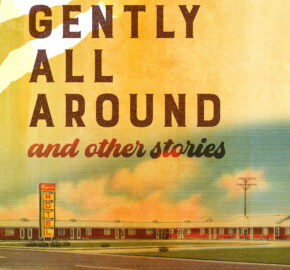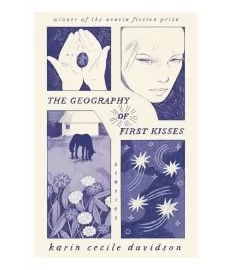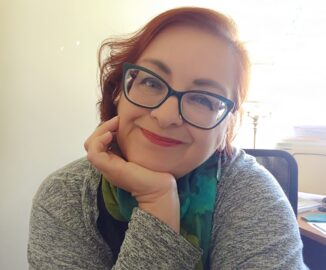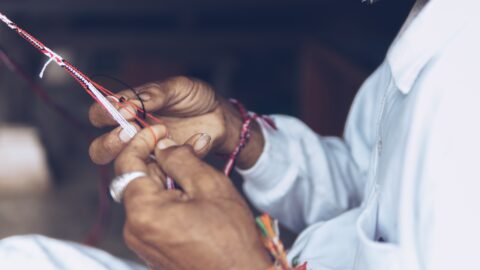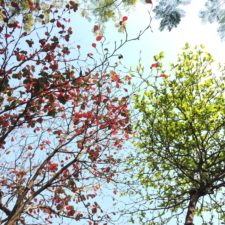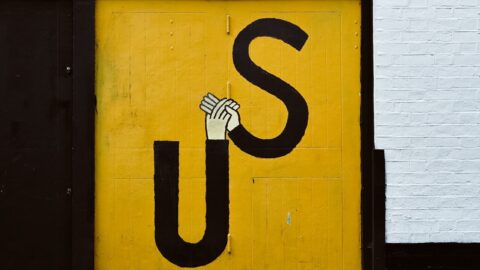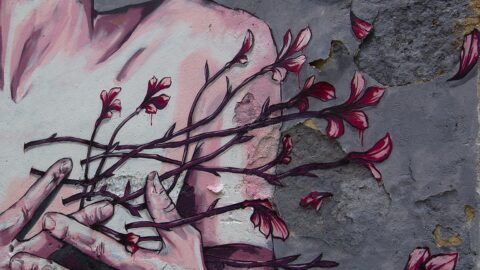Words So Odd and Ordered: An Interview with Karin Cecile Davidson
Flash • Flux
Transgressions of Place in Poetry: Eiríkur Örn Norðdahl Talks Translation
Eiríkur Örn Norðdahl is an award-winning Icelandic writer and translator based in Ísafjörður, Iceland. Long noted as an experimental poet, he has become one of Iceland’s foremost prose writers, and has translated over a dozen books into
“Saraswati Takes Back the Alphabet”: An Interview with Shilpa Kamat
I was driven by the forces that create and break language: sound, migration, immigration, alienation, speech, accent, imperialism, place, longing, myth, consciousness, archetype, universality, magic.” – Shilpa Kamat, “Saraswati Takes Back the Alphabet”
Poet, visual artist, and educator Shilpa Kamat contends with the violent legacies of imperialism, her lived experience, language, and threats of erasure in her chapbook, “Saraswati Takes Back the Alphabet,” finalist for the 2018 Anzaldúa Poetry Prize. In “eleven,” mid-way through the chapbook, Kamat writes, “the demons were never/ evil just regular/ people who prayed.”
The content of Kamat’s life—the experience of thinking across multiple languages, and being rooted in a particular lineage, Konkani, while having grown up elsewhere—is woven into the chapbook. She is concerned with nuance and layers, integrating her fascinations with magic and the sociopolitical without oversimplifying the past. Kamat is committed to exploring where magic still resides despite every violent attempt to erase it.
“French Braid”: An Interview with Rennie Ament
Part instruction manual for living, part mourning song and meditation on America, Rennie Ament’s aptly titled chapbook, “French Braid,” weaves stories of being both at home and not at home in the world. The 2018 Anzaldúa Poetry Prize finalist braids lived experiences with the absurd, painting strikingly vivid, arresting scenes that rouse readers’ emotions and intellect. As she writes, “you have to be the explosion you wish to see,” and her poetry is precisely that: an explosion that we all need to see.
Rennie Ament’s work has appeared in Colorado Review, Sixth Finch, Redivider, Yalobusha Review, minnesota review, The Journal, DIAGRAM, and elsewhere. She is the winner of the 2018 Yellowwood Prize in Poetry from Yalobusha Review and a nominee for both the Pushcart Prize and Best New Poets. She’s also received fellowships from the Millay Colony, the Saltonstall Foundation, the New York State Summer Writers Institute and the Vermont Studio Center. She lives in New York City.
Jamie Wagman: I would love to hear a bit about your writing life and your process. What’s influenced your writing? When did you first know you were a writer, and what has your journey as a writer been like? What delights and what scares you most as a writer?
Rennie Ament: Poem-wise, I don’t pay attention to semantics at first. I’ll give myself some kind of formal constraint (a sonnet, “e” the only vowel allowed, words can only come from a specific source text), but mostly I want to play in language and surprise myself. It’s fun to scribble gibberish until something sounds both strange and true.
Money and Pride Reveal Who We Are
“You know, some people here were willing to pay for that kind of service, but a lot of people have the money but don’t want to spend it.” He looks at me, pointing his finger and nodding slightly. “I think it’s just a matter of personality. Truly, I do.”
I smile in response, looking down at my hands as I dry them. It doesn’t take but one glance around the building surrounding us to know that money is a stark marker between types of people. “I think you’re right, it does depend on personality.”
As he walks away, I think about all the times I’ve seen him striding around the dealership lot, always with a purpose. The fine lines around his eyes and the slightly hunched-over posture belies a tired soul. Yet, though another of my coworkers dismisses his abilities—due to his age, of course—but I’m not so quick to judge. I find that the most capable of us out there are more comfortable away from the spotlight, the responsibilities, and even the big money.
Who Do You Work For?
“Gone are the days of walking into a business and going, ‘Here’s what I can do for you, let’s talk, hire me,’” he says, and the more I think about it, the more I agree. An inbox folder full of application confirmations (and rejections) isn’t the only evidence I have that obtaining a job isn’t as easy as it used to be.
Change is Coming and That’s Okay
“I am somewhere I don’t wanna be,” is a lyric from the Tool song “Pushit” that’s been stuck in my head for quite some time. I always loved Tool, but the lyric just hit me and stayed.
All Souls Day: Putting a Beloved Pet to Rest
On the fourth day, the rain ceased. I like to think the world wept for him, and yet when it was time, a sense of peace came about, as if to comfort me. That didn’t make the decision any easier.
Local Magic and Poetry in Noor Al-Samarrai’s “El Cerrito”
Noor Al-Samarrai’s debut poetry collection, “El Cerrito” (Inside the Castle, 2018) documents the wanderings and explorations of its narrator as she travels the suburbs of El Cerrito, California. Formally, the project is split into two major components: the poems themselves and the extensive footnotes which document the historical and personal references made throughout the book.
James Markert Blends Reality with Fantasy in “All Things Bright and Strange”
World War I was a very chaotic time in world history. Soldiers suffered from post-traumatic stress disorder and civilians often lost touch with reality as the world crumbled around them.
Nevertheless, it has been said that history is the greatest teacher even though the life lessons are usually tough to accept. Historical fiction is a great way to introduce readers to bygone eras, and James Markert’s “All Things Bright and Strange” (HarperCollins, 2018) is a powerful novel about illusions and reality within America during the early 1900s.
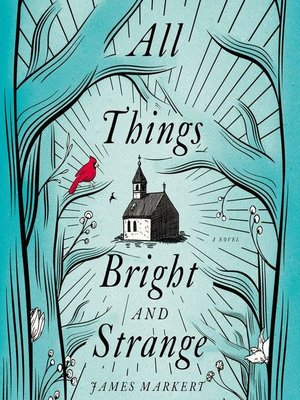
Beauty Eases Pain in Judy Jordan’s Poetry Collection “Hunger”
“What would happen if one woman told the truth about her life? The world would split open.” – Muriel Rukeyser
Poetry collection “Hunger” by Judy Jordan (Tinderbox Editions, 2018) is an honest, intimate account of a woman and her pain. The speaker in the poems faces homelessness after an accident that injured a spinal disk in the small of her back. When the hospital bills became too expensive and she fell behind on payments, the hospital seized the narrator’s bank account. Every dollar to her name is given to the hospital, leaving the woman alone, impoverished and homeless. She goes into the forest where she lives in an abandoned greenhouse, with hordes of plants and insects for Jordan to describe in detail. Our speaker is injured and unable to provide for herself, breeding a physical and spiritual hunger.
Jordan uses the protagonist’s unique situation as a playground for poetry and imagery, giving us thick, clamoring descriptions to guide us through this chaotic situation.
Eclectic Absurdism: Reading Mark Leidner’s Under The Sea
Mark Leidner’s newest book, “Under The Sea” (Tyrant Books 2018), is a collection of short stories that span across time and space, examining the lives of rural Americans, the heartbreaks of a nun, conversations between radicalized ants and far more. Each of these stories feel like a miniature novel, full of unique and engaging ideas.
What I found most fascinating about this collection was the way these stories were arranged. Although none of them are connected (thematically or narratively), there is an impressive flow that forms between them as you read.
Punishment and “Graphic Stupidity” in “Impractical Jokers”
I recently saw a meme that hit me right in the feelings. It read:
I used to have a life but then I watched “Impractical Jokers.”
One Portrait Over Time
I couldn’t tell you why it caught my eye or what drew me to it, but somehow, I knew that this one portrait was something I should claim. Like the one puppy you lock eyes with, cementing the desire to be together, the shape and the colors of the picture resonated within me.
“Have you heard back from the artist on this one yet?”
My voice was pitched to sound detached, but I knew I couldn’t entirely hide the hope for a negative answer.
“Diffusely Yours” by Kate Garklavs Suggests We Are All Connected on an Atomic Level
In the chapbook Diffusely Yours by Kate Garklavs (Bottlecap Press, 2018) each poem is a letter to a person or institution. These poem-letters are playful, absurd and full of private meaning.
The speaker diffuses bits of herself and her very visceral memories to a friend, lover or regular haunt, but it also clear she has absorbed parts of these people and places into herself as well.
Labor Day in a Beach Town and What It Means
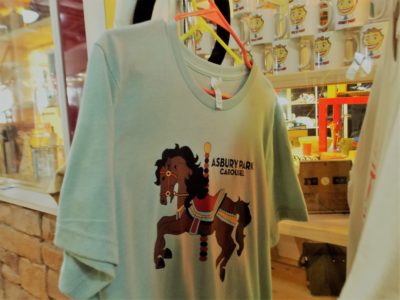
I live in Asbury Park, New Jersey. I don’t know what it means. I just got here.
I moved to a shore town to be closer to work during the final crescendo of summer. On an evening walk last month I overheard a child complain to his mother that it was still too hot, even after sundown. She joked, “We’ll have to start vacationing in Alaska.”
I cannot imagine being a person who uses “vacation” as a verb, let alone doing that verb.
Keep Playing
I first saw Chicago (the band) perform live on tour with Earth, Wind & Fire in the early 2000s. Since then, I have been to many concerts and have seen some of my all-time favorite bands perform.
I still rank Chicago and Earth, Wind & Fire in the Top Five Best Concerts I Have Ever Seen.
Movement Through Duration: Reading Anne-Marie Kinney’s “Coldwater Canyon”
“Coldwater Canyon” (forthcoming from Civil Coping Mechanisms, October 2018) is a novel that follows a Desert Storm veteran as he meanders through life,
“I’m fine, how are you?” An Interview with Prose Prize Winner, Catherine Pikula
I recently got the chance to speak with author Catherine Pikula about her prose work, “I’m fine, how are you?, which won the 2018 Newfound Prose Prize and Chapbook Contest.


